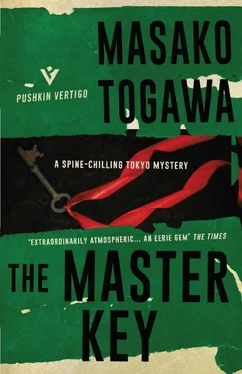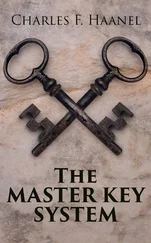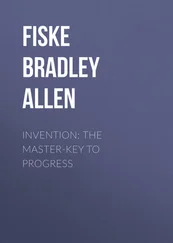When she got back to the staircase, she thought she could hear a human voice crying out in grief. But it could have been a cat miaowing, or a drunk singing in the road below. All was still again for a moment, and then she heard it quite clearly—the faint sound of a violin being played. It seemed to come from the roof. She heard the vibratos echoing in the night air. She went to the staircase leading to the roof, and as she did so, the sound became louder and then suddenly broke off.
It was pitch dark on the roof. Yoneko stood by the door, creaking on its hinges, and peering into the mist called out: ‘Miss Yatabe! Miss Yatabe!’
There was no response. Yoneko took a few steps onto the roof and, raising her voice once again, called out:
‘Miss Yatabe!’
The low railing around the roof loomed through the mist, seeming almost to be self-consciously aware of its own existence, but there was no sign of any living being. Somewhere in the distance below, Yoneko heard the shrill squeal of brakes being suddenly applied. She felt suddenly afraid. She froze where she stood, but could hear no sound about her. There was something unpleasant in the air.
The next morning, she awoke to shouts that told her what it was. Suwa Yatabe had committed suicide by jumping from the roof. She had put down the famous violin before leaping to her death, and her body was found on one of the piles of earth which had been excavated from the foundations.
Yoneko reflected on how she and Suwa had passed each other the night before, she on her errand and Suwa hurrying on the way to her death. Now she understood why she had heard the violin but had found no trace of Suwa. Suwa had been bidding farewell to the world on the instrument she loved so much, but Yoneko had interrupted her, and she had gone without completing her tune.
Yoneko felt sad thinking of the last years of Suwa, the violinist whose hopes had turned to sorrow. She did not doubt that Suwa had committed suicide, but one thing puzzled her.
Why, when Suwa passed her on the way to the roof, had she been empty-handed?
On the day of the move, it was windy from dawn on, and dust and grit from the excavations whirled in the air and crept into every corner of the building.
The death of Suwa Yatabe two days before had left everyone stunned, but the excitement of the move now brought things back to life. They got ready for the experiment with the glass of water, which they had looked forward to for so long. Some even made innocent little wagers with cakes or sweets on the outcome. But Yoneko was indifferent to such goings on. She had passed by Chikako Ueda’s door once early on in the morning but thereafter had returned to her room to await quietly the hour of noon, and the moving of the building.
She was working out what she should do if her ruse caused Chikako to confess where the child was buried. She had expected to hear from the police after she had revealed all she knew to Keiko, but this had not happened.
She puzzled over where the child could be buried. All the soil around the building and in the courtyard had been dug out to quite a depth, so it couldn’t be there. Perhaps under the walls, or the foundations of the incinerator? She remembered the words she had heard about being in a suitcase covered in cement, so such a place seemed likely. Or under the floor? Anyway, if Chikako confessed, she could get the workmen to dig up wherever it was, and then her first action, she decided, would be to call the police.
This led her to imagine Chikako locked up in a cell, which made her feel even worse. She did not enjoy interfering in other people’s lives or laying bare their secrets for all to learn. Little had she dreamed, when she began to write to her pupils to overcome the boredom of retirement, that it would end in her exposing someone else and causing her to be dragged off to prison. She began to regret what she had done. Chikako had waited alone in her little room for seven years, and the man had not come; was not this punishment enough? Was it really essential for her to be put at the disposal of merciless public opinion? That would not bring the child back to life.
Yoneko cast her mind back to the three months after her retirement, when she had sat alone in her room gazing at the cold walls. What thoughts had crossed her mind then? Had she reflected back on the life of an old maid who had just let the days go by and life pass with them? She wondered if she had pursued Chikako so relentlessly out of jealously because she had at least had an affair with a man? This thought made her feel she had lost all her strength and purpose.
Reflecting thus upon her solitude, Yoneko glanced down at her watch, which she had put on the table. It was five to twelve. She got up to go to Chikako’s room.
Not a soul was to be seen in the corridors or on the staircase, and the whole building was eerily silent.
Just as she reached Chikako’s room, the noon siren wailed at a nearby factory. She thought that the building would now begin to move, and rushed to the window but could see nothing to suggest that the move had begun.
She knocked on Chikako’s door and turned the knob, but the door was locked. She used the master key to open it. When she got inside, she found Chikako lying with her head on the low table. She had knocked over a glass of water as she fell, and it had dripped onto the floor, where an empty pill bottle had also fallen.
This, then, was Chikako’s reply. Was it an admission of guilt or an assertion of innocence? For a second, Yoneko felt dubious, and then she knew the answer. Innocence would not drive one to kill oneself—this was a confession that she had indeed buried the child. She had chosen to die so that the secret would die with her.
Yoneko broke out in a cold sweat, and felt aggrieved at being thus cheated. She dearly wanted to know where the body lay. She looked around to see if there was any sign of a suicide note, but there wasn’t. So she would have to work out the answer to the mystery by herself.
At least she now knew for certain that the child was buried somewhere near at hand. Any lingering doubts were overcome by the fact of Chikako’s death. So the poem told the truth.
The poem was true… Yoneko grasped the point in an instant.
‘The bath! The bathroom! That’s it!’ Yoneko felt herself shouting inside her heart. The dried-up lake plainly referred to the disused bath in the basement. And seven years ago the cement left over from the repair work interrupted by the war was still lying around that bathroom. Thereafter, it had been removed, and the bathroom used as a storage place for furniture from the communal rooms, old stoves, and so forth.
She rushed out of Chikako’s room and down the stairs to the basement. She was determined to break open the bath herself. At that moment, she was no longer the retired old maid but the gambler turning the card which would seal her fate. Life and youth flowed back into her.
Chikako’s door was left open, so that anyone passing by could see her lying face down on the table, the spilt water about her.
And the master key remained in the lock, just as Yoneko had left it.
PART EIGHT
Some months after the building was moved
Miss Tojo’s Chronicle
I suppose I decided to set this all down in some proper form, as an archive for the future, during those thirty irritating minutes while the move of the building was delayed.
During that half hour, I just gazed at the glass of water which was on the dusty table in front of me, not knowing whether to laugh or to cry. My feelings were not directed at anything or anyone in particular, but at the caprices of fate which can bring about changes in the best laid plans of mice and men, as the saying goes. Fate! It can stab you in the back any time, upsetting the most carefully thought out activities. Fate doesn’t care what the upshot is.
Читать дальше












